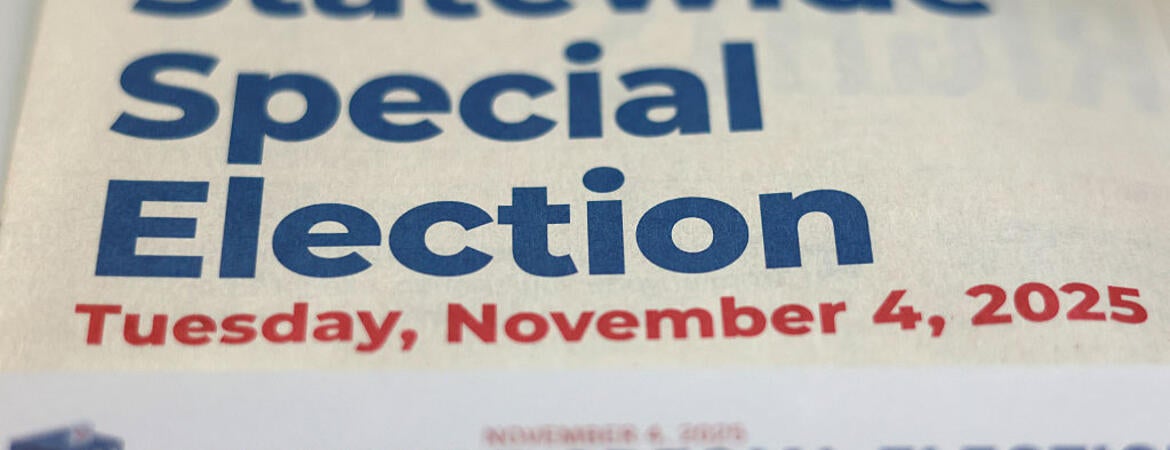
In August, Texas state legislators voted for a mid-decade redistricting plan that is likely to turn five U.S. House of Representatives seats from Democrat to Republican. Soon after, California Gov. Gavin Newsom announced a retaliatory effort, a special election in which California voters are asked to approve new congressional maps drawn by Democrats, bypassing the state’s independent redistricting commission. The plan would likely flip five red seats to blue. Republican donors including Charles Munger Jr. initially invested heavily in the “No” campaign, even as Newsom’s “Yes” effort has raised more than $250 million.
Election day is Nov. 4, though California voters have been casting ballots for several weeks by mail. We asked polling expert Andy Crosby from the UCR School of Public Policy to assess the most current Prop 50 polls, and asked UCR political scientists Shaun Bowler and Ben Bishin for analysis.
Andy Crosby’s assessment of current polls
Overall, Prop 50 has solid support among likely voters in California. Based on a recent poll of 1,504 registered voters in California conducted October 16-21 by CBS News/YouGov, 62% of respondents indicated they would vote yes to authorize temporary changes to congressional district maps if the election were held today, while 38% of respondents indicated they would vote no.
Unsurprisingly, we see stark partisan differences in support: 85% of Democrats indicated they would vote yes on Prop 50 if the election were held today, compared to 60% of independents and only 22% of Republicans indicated they would support the proposition.
We also notice differences in support based on age: 70% of respondents under 30 indicated they would support Prop 50 if the election were held today, compared to 67% of respondents aged 30-44, 61% of respondents 45-64, and 56% of respondents aged 65 and over. Differences also exist by education: 67% of respondents with a four-year degree indicated they would support Prop 50 if the election were held today, compared to 57% of respondents with no degree. Finally, we do see some variation in support between racial and ethnic groups, although not as pronounced as political party or age: 61% of white respondents indicated they would support Prop 50, compared to 64% of Black respondents, 67% of Hispanic respondents, and 59% of Asian respondents.
The overall polling results are outside of the poll's margin of error of +/- 3.8 percentage points, which indicates likely passage of Prop 50 if the election were held today. Of course, we do know that changes in support may still occur between now and the election. Stay tuned for what will no doubt be an interesting week ahead.
Shaun Bowler on (possibly) unintended consequences of redistricting
A big component of Congressional elections historically has been about local issues. The member of Congress was supposed to take local issues to D.C. and advocate for the community. That’s part of the idea of having geographic districts for elections. We have interests and viewpoints as Riversiders that are different from other Californians, let alone Texans or Iowans.
The thing about the Texas redistricting is that it pushes local concerns to the backburner; the main point of the election becomes to support the national party in a national party contest.
We don’t know how much Texas’s redistricting has shifted the grounds in terms of participation in politics. It has effectively disenfranchised a lot of Democrats. But we can also say it has disenfranchised Republicans, too. There isn’t really any need for Republican voters to turn out — and just as important not much need for them to donate to the party, because the GOP candidate is going to win anyway.
The Texas Republicans have started something. They have called into question "the federal contract” — the contract between the states and the federal government. It’s not clear where it ends.
Q: A recent poll found 62% of likely voters in favor of the measure. In his television advertising, Democrat Tom Steyer asked voters to "stick it to Trump" by voting yes for Prop 50. Should the polling be interpreted as an expression of dissatisfaction with the Trump administration? Does it translate to outcomes in the November 2026 midterms?
Bishin: Yes, it is a measure of opposition to Trump and his attempt to prevent the loss of the House of Representatives. Without the House, Trump's agenda is much more difficult to pursue. Trump is unpopular nationally and especially in California. The entire point of these district changes in Texas and now apparently in North Carolina is to maintain the GOP House majority in 2026.
Bowler: This is being pitched as a vote for or against Trump. And as the polls show, the anti-Trump sentiment is more intense than the pro-Trump sentiment. But you do wonder whether there is sentiment where some people are voting not so much as Republicans or Democrats but as Californians against Texas.
Q: Have Republicans effectively abandoned the "No" campaign for Prop 50?
Bishin: (Republicans) had trouble raising the money they had hoped for. They also seem to have accepted that Proposition 50 will pass. But this will depend on turnout.
Bowler: It does seem that the air has been let out of the NO campaign. (Former House Speaker Kevin) McCarthy was promising to raise all kinds of money for it and that doesn’t seem to have worked.
Q: Several states are now gerrymandering their electoral districts, or considering doing so. How would the framers of the constitution view this redistricting tactic?
Bishin: Our society today looks nothing like the one the framers lived in or designed. They'd be surprised that the Electoral College works the way that it does, that senators are popularly elected, and that the masses could vote. I do think many would find gerrymandering to violate the republican (small r) values to which they aspired.
It's noteworthy that the Supreme Court is set to hear a case on the Voting Rights Act which may also allow for (or even require) additional redistricting in some states. And with a highly partisan Supreme Court, it’s not out of the question that the Proposition could be challenged and taken to the U.S. Supreme Court, where it might be thrown out. I don’t see a legal basis for that, but we have seen a number of rulings based on reading of the Constitution and law lacking such basis.






